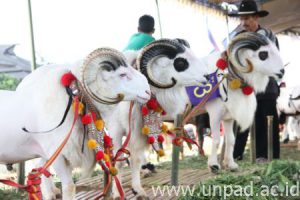[Unpad.ac.id, 18/06/2013] The office of livestock service in collaboration with the Faculty of Animal Husbandry Universitas Padjadjaran organizes annual competition; Livestock contest 2013 on June 17-18, 2013 in PPBS ground in Jatinangor.

The contest covers competition on cattle productivity and outward appearance of five categories dairy cows (ratu, bibit, dara), beef cow (male beef cow age 2-3 years old and female beef cow 1.5-2 years old), rams (ratu, bibit, raja pedaging, raja kasep, calon pejantan), and sheep (ratu bibit, pejantan). It is organized to evaluate the success of breed development in West Java and assess level of competitiveness of young breeders.
According to vice governor of West Java, Deddy Mizwar, on the one hand, cattle production in West Java is still wanting despite its natural resources and other potentials; on the other hand, the people’s demand is considerably high. “We somehow have to find a way to make the people of West Java accustomed to farming,” said Deddy Mizwar when opening the contest on Tuesday (18/06).
Mizwar, recently elected vice governor, expressed his concern on the diminishing species of West Java origin. He suggested that livestock service do research and development on this. In addition, Mizwar recommended that the contest be held more often, not only once a year, but perhaps twice or three times a year.
Of the overall contest, the regency of Bandung comes out as the overall winner, defeating contestants from other cities and wins the trophy from the Governor of West Java, handed in directly by the vice governor. Mizwar made the time to go to cattle stands and supervise all the cattle being contested. He also drank a glass of sheep milk from Ettawa Breeding.
On the same occasion, Unpad vice rector III, Dr. med. Setiawan, dr. stated that the contest would bring so many positive impacts for both the breeders and Unpad in terms of developing community-based discipline. “Communication, therefore, will be established among lecturers, breeders, and stakeholders at large,” said he.



